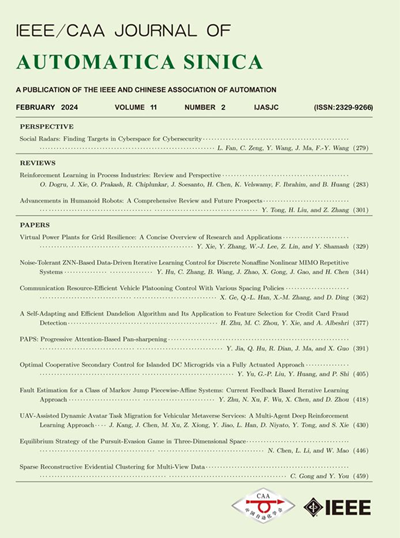Broad-Learning-System-Based Model-Free Adaptive Predictive Control for Nonlinear MASs Under DoS Attacks
IF 15.3
1区 计算机科学
Q1 AUTOMATION & CONTROL SYSTEMS
引用次数: 0
Abstract
In this paper, the containment control problem in nonlinear multi-agent systems (NMASs) under denial-of-service (DoS) attacks is addressed. Firstly, a prediction model is obtained using the broad learning technique to train historical data generated by the system offline without DoS attacks. Secondly, the dynamic linearization method is used to obtain the equivalent lin-earization model of NMASs. Then, a novel model-free adaptive predictive control (MFAPC) framework based on historical and online data generated by the system is proposed, which combines the trained prediction model with the model-free adaptive control method. The development of the MFAPC method motivates a much simpler robust predictive control solution that is convenient to use in the case of DoS attacks. Meanwhile, the MFAPC algorithm provides a unified predictive framework for solving consensus tracking and containment control problems. The boundedness of the containment error can be proven by using the contraction mapping principle and the mathematical induction method. Finally, the proposed MFAPC is assessed through comparative experiments.DoS攻击下基于广泛学习系统的非线性质量无模型自适应预测控制
研究了非线性多智能体系统(NMASs)在拒绝服务(DoS)攻击下的遏制控制问题。首先,利用广义学习技术对系统脱机生成的历史数据进行训练,得到预测模型。其次,采用动态线性化方法,得到了NMASs的等效线性化模型;然后,基于系统生成的历史数据和在线数据,提出了一种新的无模型自适应预测控制(MFAPC)框架,将训练好的预测模型与无模型自适应控制相结合。MFAPC方法的发展激发了一个更简单的鲁棒预测控制解决方案,便于在DoS攻击的情况下使用。同时,MFAPC算法为解决共识跟踪和遏制控制问题提供了统一的预测框架。利用收缩映射原理和数学归纳法证明了包含误差的有界性。最后,通过对比实验对所提出的MFAPC进行了评价。
本文章由计算机程序翻译,如有差异,请以英文原文为准。
求助全文
约1分钟内获得全文
求助全文
来源期刊

Ieee-Caa Journal of Automatica Sinica
Engineering-Control and Systems Engineering
CiteScore
23.50
自引率
11.00%
发文量
880
期刊介绍:
The IEEE/CAA Journal of Automatica Sinica is a reputable journal that publishes high-quality papers in English on original theoretical/experimental research and development in the field of automation. The journal covers a wide range of topics including automatic control, artificial intelligence and intelligent control, systems theory and engineering, pattern recognition and intelligent systems, automation engineering and applications, information processing and information systems, network-based automation, robotics, sensing and measurement, and navigation, guidance, and control.
Additionally, the journal is abstracted/indexed in several prominent databases including SCIE (Science Citation Index Expanded), EI (Engineering Index), Inspec, Scopus, SCImago, DBLP, CNKI (China National Knowledge Infrastructure), CSCD (Chinese Science Citation Database), and IEEE Xplore.
 求助内容:
求助内容: 应助结果提醒方式:
应助结果提醒方式:


